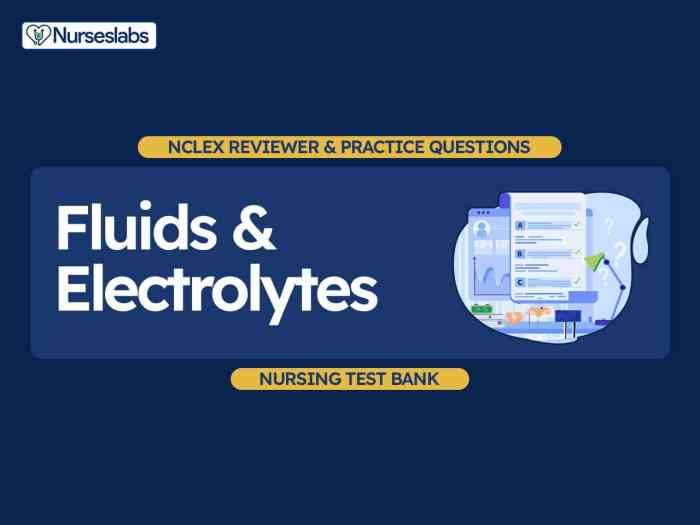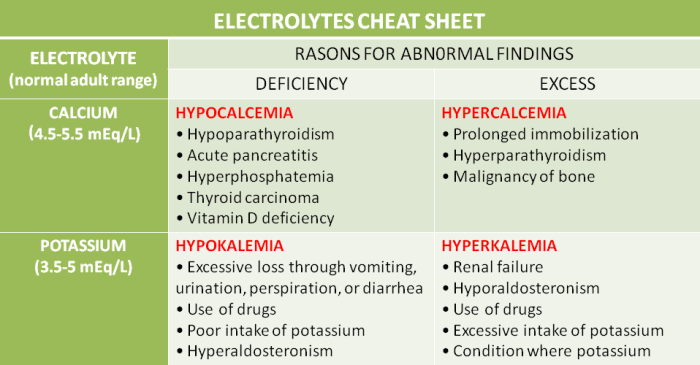Nclex practice questions on fluid and electrolytes – Delve into our comprehensive NCLE-style practice questions on fluid and electrolytes, meticulously crafted to empower you with the knowledge and skills essential for success in nursing practice. These questions delve into the fundamental concepts of fluid and electrolyte balance, exploring their roles, imbalances, and the nursing interventions required to manage these critical aspects of patient care.
By engaging with these practice questions, you will gain a deeper understanding of fluid and electrolyte imbalances, their clinical manifestations, and the strategies employed to restore balance and prevent complications. Prepare yourself for the NCLEX and enhance your nursing practice with this invaluable resource.
Fluids and Electrolytes Overview: Nclex Practice Questions On Fluid And Electrolytes

Fluids and electrolytes are essential components of the human body, accounting for approximately 60% of body weight. They play crucial roles in maintaining cellular function, regulating body temperature, and transporting nutrients and waste products.
Roles and Functions of Fluids and Electrolytes
- Water:The primary component of body fluids, water facilitates biochemical reactions, transports nutrients, and removes waste products.
- Electrolytes:Charged ions such as sodium (Na+), potassium (K+), chloride (Cl-), and bicarbonate (HCO3-) regulate nerve and muscle function, maintain blood pH, and control fluid balance.
Fluid Balance and Imbalances

Principles of Fluid Balance
Fluid balance refers to the equilibrium between fluid intake and output. The body maintains fluid balance through the kidneys, lungs, skin, and gastrointestinal tract.
Fluid Imbalances, Nclex practice questions on fluid and electrolytes
- Dehydration:Occurs when fluid loss exceeds intake, leading to decreased body fluid volume and electrolyte imbalances.
- Overhydration:Occurs when fluid intake exceeds loss, resulting in increased body fluid volume and potential electrolyte dilution.
Electrolyte Balance and Imbalances

Importance of Electrolyte Balance
Electrolyte balance is crucial for cellular function, including nerve conduction, muscle contraction, and cardiac rhythm.
Electrolyte Imbalances
- Hyponatremia:Abnormally low sodium levels, which can cause seizures, confusion, and coma.
- Hypernatremia:Abnormally high sodium levels, which can lead to dehydration, muscle weakness, and confusion.
- Hypokalemia:Abnormally low potassium levels, which can cause muscle weakness, fatigue, and cardiac arrhythmias.
- Hyperkalemia:Abnormally high potassium levels, which can lead to muscle paralysis, bradycardia, and cardiac arrest.
Nursing Assessment and Management
Nursing Assessment
Nursing assessment includes monitoring vital signs, fluid intake and output, and electrolyte levels. Nurses assess for signs and symptoms of fluid and electrolyte imbalances, such as thirst, dry mucous membranes, edema, and muscle weakness.
Nursing Interventions
- Fluid Management:Nurses administer fluids as prescribed to correct dehydration or overhydration.
- Electrolyte Replacement:Nurses administer electrolytes to correct imbalances, such as potassium supplements for hypokalemia.
- Monitoring and Education:Nurses monitor patients for complications and educate them on fluid and electrolyte balance.
Top FAQs
What is the significance of fluid and electrolyte balance in nursing practice?
Maintaining fluid and electrolyte balance is crucial for optimal cellular function, organ perfusion, and overall patient well-being. Nurses play a vital role in assessing, monitoring, and managing fluid and electrolyte imbalances to prevent complications and promote patient recovery.
How do these practice questions align with the NCLEX exam?
These practice questions are meticulously designed to mirror the format and content of NCLEX-style questions, ensuring that you encounter similar scenarios and question types on the actual exam. By practicing with these questions, you can enhance your confidence and preparedness for the NCLEX.
What is the recommended approach to answering these practice questions?
To maximize the benefits of these practice questions, approach them as if you were taking the actual NCLEX exam. Time yourself, read each question carefully, and select the best answer based on your knowledge and understanding of fluid and electrolyte management principles.